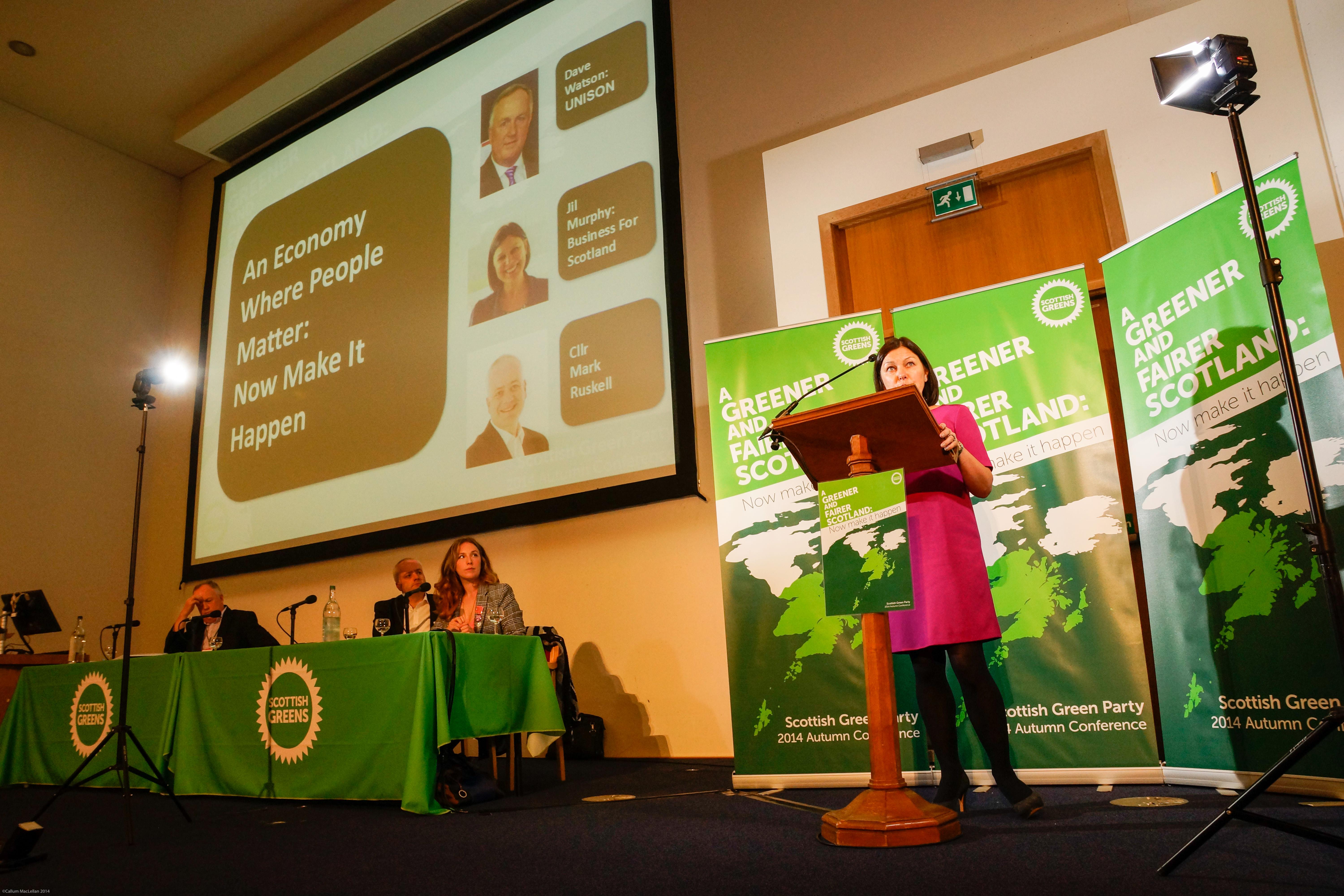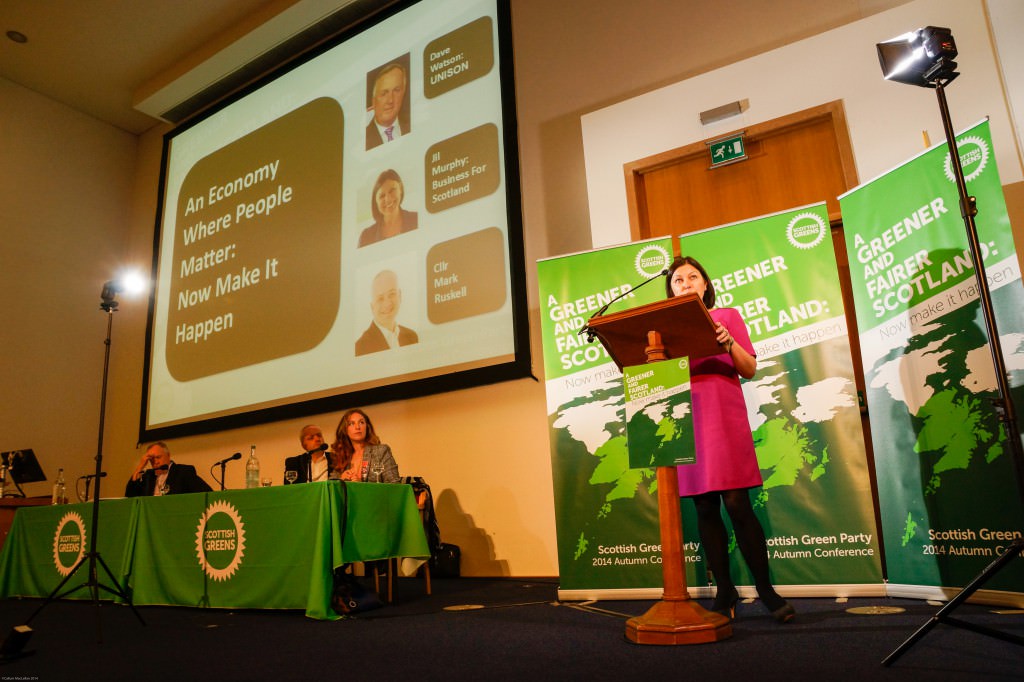Business for Scotland’s Edinburgh group leader Jil Murphy, was invited to give a speech to the Green Party Conference last weekend on the subject of SMEs and their contribution to the economy.
Jil is a successful business person, the co founder of Thin Red Line Design, as well as the leader of our Edinburgh Group. She was delighted to take up this invitation to make the positive case for sustainable economic change in front of a sold out Green Party Conference. Business for Scotland has always been a non party political organisation. While we have strong views on a number of different policies, we welcome members from any of the major political parties.
Read Jil’s speech below, and let us know in the comments if you agree or disagree with her vision for a more sustainable, local and representative economy.
SMEs as the backbone and driver of the Scottish economy
I’m here representing Business for Scotland and for those of you that don’t know our organisation, we’re a non-politically aligned business co-operative and think tank with over 3,000 members from a wide range of business sectors. Many represent the SME community, others run large companies. We have regional groups throughout Scotland and all our members support independence for Scotland.
Going forward, we believe that we still have a key role to play in creating a strong, ambitious, business vision for Scotland and ensuring that the business community receives the support and encouragement it needs to flourish. Our aim is to help create economic and business policies that will drive Scotland forward and to campaign for the powers we need to let Scotland’s economy and society thrive.
I’m the Edinburgh Group leader for Business for Scotland, I also own a small business, called ThinRedLine Design and have been asked here to discuss the role of SMEs as the backbone and driver of the Scottish economy.
SMEs are vital drivers of our economy, accounting for 99.3% of the private business sector in Scotland; the vast majority, more than 98%, are small businesses. They are the lifeblood of the Scottish economy and with the right investment and support; SMEs will continue to be future innovators and job creators.
We live in a period of global economic change and opportunity. To promote the type of Scotland we all want to see – one that is greener, fairer and more progressive – the Scottish SME community must be ambitious in it’s vision of what we can do going forward and be willing to work together to make that happen. We have spent the last couple of years discussing our bold ambition for our country; it’s time to make that ambition a reality.
From an economic perspective this means: increasing productivity, innovation, research & development, entrepreneurship, infrastructure investment and job creation through focused business growth policy decisions. This marks a clear opportunity for business leaders across Scotland to get involved.
An opportunity for us all to rebalance the Scottish economy towards locally-owned, sustainable businesses that favour long term growth and at the same time challenge the dominance of multinationals and economic short term, ‘me first’ profit based ideology.
We must nurture small business growth to focus upon developing medium size companies. Our lack of businesses of this size means that we are often at a commercial disadvantage and leaves us over dependent on large corporations, a problem that damages our competitiveness, salaries, wealth creation, stability, fairness and industrial democracy. We must harness a new ethos of collaboration to ensure that the economic potential of Scotland, through SMEs, is unlocked to the full.
For this reason it’s crucial for civic and government leadership to also become more ambitious and outward looking. We need to create an economy that favours high-pay, high-skill, productive enterprises. We also need to develop a society where concern for the local environment and the erosion of poverty and inequality through job creation is paramount.
One legacy of the independence debate is that we have a politically engaged and active population; we need to develop that activism and engagement within the Scottish business community. Another legacy is that we have actively looked beyond our own borders to learn from other countries. Scotland needs to innovate and the best way to do that is to look at the most relevant examples of success.
There is overwhelming evidence that the most successful European democracies have nurtured a strong SME sector, which has been key to their decentralised, democratic and progressive economies. It is also pivotal in creating wealthier, more stable, and more confident populations. This supports the development of equality for women, fairness for families and strong industrial democracy.
Often what these European SMEs have in common is a long-term approach to investment and growth, a high degree of technical specialisation, strong local community integration and a genuine partnership between employees and management. They have created a high wage economy and a culture where businesses can thrive whilst people live in healthy local communities.
Few businesses with such high levels of community integration will ever be sold and relocated for short-term profit; the community and business have too much mutual investment. It is this industrial model that Scotland must develop if it is to create a highly profitable industrial base which can also help create social justice.
People in well-paid jobs do not need as much support from social security services. Opportunity for business and social justice go hand in hand. Socially responsible, long term business strategies create happier places to live and work. They are also better placed to adapt and sustain through downturns.
Examples of areas where Scottish business can do better by prioritising equality and sustainability are –
Decentralisation – even within Scotland, the funding and distribution of businesses are biased towards cities. We need a focus on development of policies, support networks and training, not just in our cities but in the regions too, to encourage business development in local communities.
Fairness & equality – Europe has shown us that there are massive commercial advantages for medium sized companies in Europe when they install the culture of high-value products, industrial democracy and sustainable business development.
Social enterprise – financially, environmentally and socially sound business – there is no such thing as them and us, only us. It’s not economic growth but social growth that makes business much more sustainable We should educate in business and economic courses about social well-being and local involvement, in schools, colleges and universities.
Entrepreneurship – we must continue to develop school competitions and awards sponsored by industry to encourage entrepreneurship. We must be outward looking, exporters, always thinking about what can we give the world and what the world can give us. We also need to teach ourselves that it’s okay to fail and that success is not static but a journey, giving people the confidence to try, fail and try again.
Funding – business should work with government agencies, lenders and capital to establish funds for the support of small to medium business evolution and for the development of businesses in local communities. Another opportunity is through crowd funding, this supports entrepreneurship and has introduced those with money to people with marketable ideas. Perhaps it’s also time to look at new banking models – with a national investment rather than shareholder focus – local publicly-owned banks and savings banks could invest in local infrastructure projects, small businesses, mutuals and co-operatives.
Empowerment – empowerment is about removing barriers and not about giving power. Bring your brain to work, solve problems & innovate rather than expecting someone else to – as an employee you know the problems & the solutions. We can encourage equality, responsibility & empowerment through support structures, mentoring and education.
Investment – investment in the economy prioritising long-term improvements in skills, productivity and innovation. Infrastructure investment would result in quicker, cheaper transport of goods & services. Research & innovation investment through business and education partnerships would grow productivity. Local trade investment would keep business local. Connectivity investment, such as rural broadband, would allow business growth in more remote areas.
There is also opportunity to promote and nurture the distinct and clear branding of Scotland, to support exports and to build upon the quality status we already enjoy.
Let’s build upon our numerous economic strengths. Let’s always have bold ambition for our society. Let’s work together as if we are living in the early days of a better nation.
If SME business owners, decision makers and elected representatives work with shortened communication connections, with shared values of profit and growth, coupled with social and environmental awareness and concern, then a better, fairer, more prosperous Scotland is possible.
—–
Business for Scotland will continue to campaign for the Scottish business community. If you’re not a member already, Join us Now
Photographs by Callum MacLellan










This is a very welcome speech and sets out a vision which strongly resonates with the ideas being shaped in the Common Weal as well as the Scottish Green Party.
Key to delivery of this sort of vision is fundamental reform of the banking and monetary system. Decentralised banking with a network of strong local and regional banks is a must but we need a new approach to management of the money supply and money creation…..Positive Money (http://www.positivemoney.org/) have some interesting ideas which should be explored and Martin Wolf of the FT is also advocating a shift away from money creation by commercial banks towards state control of money creation.
Pension funds too need to be redirected from allocating their assets for speculative financial trading and towards investment in productive activity, infrastructure and social housing. Check out John Clancy’s book “The Secret Wealth Garden” (http://www.thesecretwealthgarden.com/)
I have my doubts that the vision set out by Jil would have been realised in an independent Scotland based on the SNP’s White Paper. It is unfortunate that we did not have a full and open, informed debate about the potential benefits of an independent Scottish currency which would have enabled radical banking and monetary reform…..something precluded by the favoured monetary union with rUK. The Greens certainly favoured a new currency but they did not argue any clear vision of its benefits and how it could work….a pity…..maybe next time…..